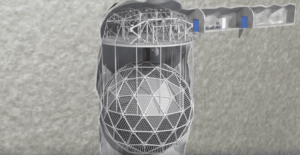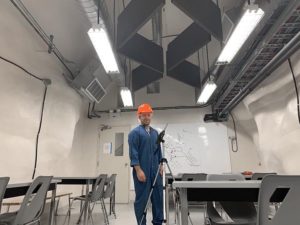SNOLAB Underground Science Laboratory

Location: Vale Creighton Mine, Sudbury, Ontario, Canada
Owner/Operator: SNOLAB
SNOLAB is a world-class Canadian science laboratory located 2km (1.24 miles) deep underground within a functioning nickel mine operated by Vale, near Sudbury, Ontario. The lab specializes in neutrino and dark matter physics research. Although accessed through an active mine, the facility itself is maintained as a class-2000 cleanroom, making it the deepest cleanroom facility in the world. The combination of great depth and cleanliness allows for extremely rare experimental interactions and weak processes between sub-atomic particles to take place and be studied. A team of over 100 research scientists and supporting staff work in the underground laboratory.
 HGC was contracted by SNOLAB to investigate complaints by laboratory staff who indicated that the acoustical conditions in the lab’s lunch/kitchen area, and the adjoining meeting room were problematic such that conducting productive meetings or having comfortable and clear conversations were both difficult and frustrating. An additional consideration was that the traditional fibrous and/or combustible materials that are typically recommended to improve acoustics and/or mitigate noise under these circumstances were prohibited in the SNOLAB facility, so as to maintain its cleanroom and fireproof status.
HGC was contracted by SNOLAB to investigate complaints by laboratory staff who indicated that the acoustical conditions in the lab’s lunch/kitchen area, and the adjoining meeting room were problematic such that conducting productive meetings or having comfortable and clear conversations were both difficult and frustrating. An additional consideration was that the traditional fibrous and/or combustible materials that are typically recommended to improve acoustics and/or mitigate noise under these circumstances were prohibited in the SNOLAB facility, so as to maintain its cleanroom and fireproof status.
Upon investigation it was determined that, for the most part, all surfaces (walls, floors, and ceiling) were sound reflecting, consisting primarily of painted concrete, which greatly contributed to audible levels of reverberation (echo). Measurements and observations of background sound levels also indicated that the ambient conditions were relatively noisy, due to several mechanical sources of noise such as kitchen appliances, the HVAC system, and proximity to the SNOLAB mechanical room. Voice transmission between the two spaces was also observed to be significant, especially when the lunchroom was occupied, and was discerned to be a contributing factor to the poor acoustics.

Through the course of our investigation we confirmed that there were two distinct areas of acoustical deficiency: high levels of reverberation and high levels of background sound from mechanical equipment.
To improve the excessive levels of reverberation in the meeting and lunchrooms, we recommended installing fire-proof and cleanroom friendly acoustical panels around the interior of the spaces, specifically on the walls and ceilings. Various non-fibrous product options were proposed, such as acoustical panels made of polypropylene beads, spray-on Portland cement products for controlling acoustics, among others.
To control the high levels of background sound from the mechanical equipment, our recommendations were to mitigate equipment at-source using silencers (without fibrous filling); using enclosures (to isolate noisy components) or replacing equipment with less noisy alternatives. We also proposed sealing gaps and transmission pathways between the spaces where appropriate.
Acoustical consulting services delivered:
- Workplace Noise Investigation and Mitigation Recommendations
- Acoustic Assessment and Optimization (for speech intelligibility)
- Sound Level Measurements and Modelling of Room Reverberation

